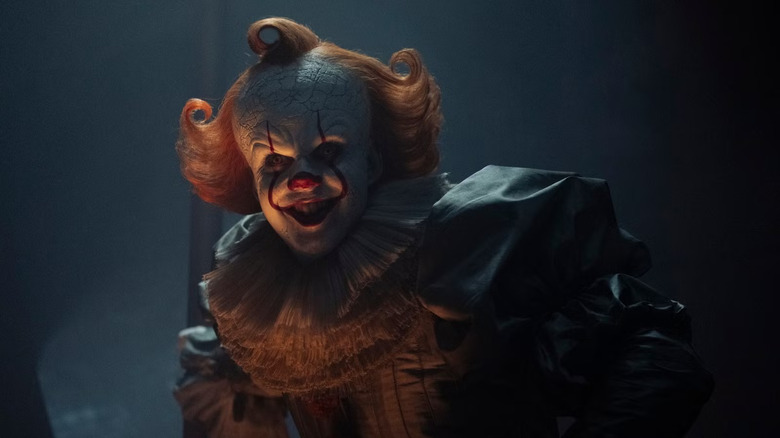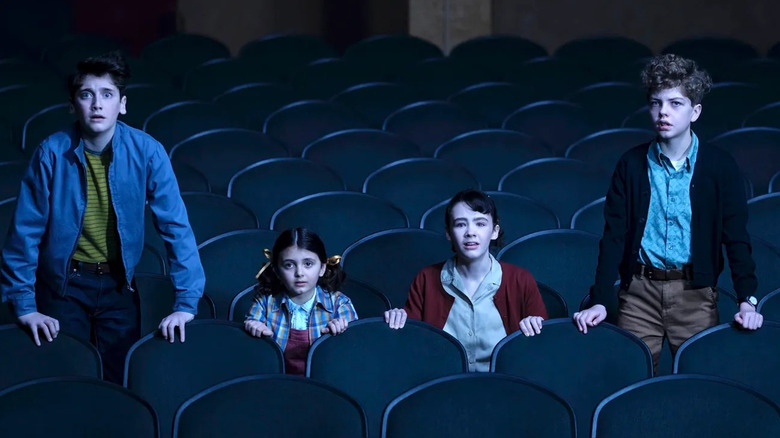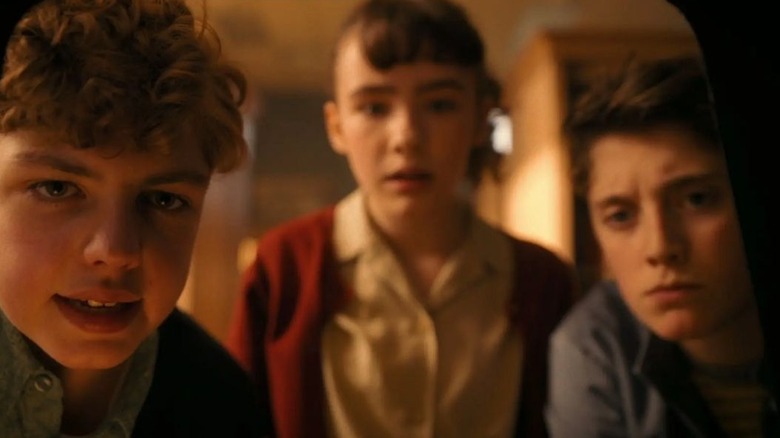It: Welcome To Derry's Creators Expected HBO To Fight One Aspect Of The Stephen King Series
This article contains spoilers for the first episode of "It: Welcome to Derry."
It's a question as old as scripted television itself: How do you hook viewers into a new series? For many showrunners and producers, the answer has typically revolved around casting likable actors in compelling roles, with the understanding that audiences might be interested in their relationships and exploits going forward. On the viewer's side, it's generally a good rule of thumb that if you watch the first episode of a series and you enjoy the protagonists, you'll probably enjoy watching the rest of the show. Of course, another strategy for showrunners is to demonstrate to the audience a series' boldness, to tell them to expect the unexpected. One of the quickest, clearest, and still transgressive ways of doing that is to kill off one (or more) of the protagonists in your pilot episode.
That's a trick which hasn't been pulled off that many times, despite the desire some past series had to try it. (Famously, the "Lost" pilot was originally written to have Jack killed off by the end of the first episode, only for those plans to change.) The folks behind the new series "It: Welcome to Derry" realized that, because the show is a prequel set 27 years before the first "It" film, they had the leeway to try this gambit out. Thus, the first episode establishes some teen characters who seem like they're going to be ongoing, only to have them brutally killed off during a horrific setpiece at the end of the episode. While this choice perfectly sets up how surprising, unsettling, and bold the show aims to be, it was understandably nerve-wracking for showrunners Jason Fuchs and Brad Caleb Kane to pitch it to HBO. Fortunately, the pitch went so well that not only did it reassure the creative team that the network was on board, it also gave them a new goal to reach for.
How the Welcome to Derry showrunners pulled a fast one on HBO executives
The big twist at the end of the premiere episode sees the characters Phil (Jack Molloy Legault), Teddy (Mikkal Karim-Fidler), and Susie (Matilda Legault) violently killed by a form of Pennywise the demon, leaving just Lilly (Clara Stack) and Ronnie (Amanda Christine) as the only survivors. In order to help sneak this concept past the HBO executives, Fuchs apparently wrote a version of the pilot script in which all the kids lived through Pennywise's attack in the movie theater. The showrunner then assembled a mini writer's room, which included only himself, Kane, and Andy and Barbara Muschietti, who secretly planned the shocking demise. As Fuchs explained during an interview with Entertainment Weekly, the writers then pitched this idea to the HBO brass with a bit of theatrical flair:
"It was a product of that mini room experience where we decided, 'What if this happened?' So the network didn't know that was going to happen in the context of the pitch. We had a wall with headshots of child actors who would've played the kids in [episode] 101. Andy theatrically stood up as I was pitching. I got to the part where all of them, other than Lilly and Ronnie, [were] being eaten. Andy pulled the paper down, and there was a whole other group of kids [headshots] under there."
Of course, this pitch could've gone very badly. Not only does it have the potential to annoy and alienate viewers, it also requires some actors (child actors, to boot) to be hired who are good enough to be leading players but are actually jettisoned from the series very quickly. Thus, it would be understandable if the executives balked at the proposal.
The reaction to their twist pitch gave the showrunners confidence
Fortunately, the HBO execs loved the pitch, especially because it genuinely shocked them when it happened. As Fuchs recalled:
"I'll never forget seeing their faces and feeling like, 'If we can replicate their reaction in the room with audiences at home, we'll have a really interesting, exciting, satisfying way to end episode 1.'"
As Barbara Muschetti confessed in the same EW interview, the executives becoming supportive of the twist was something they hoped for but didn't expect, and it came as "a huge relief," not just because it meant that they could get away with such an audacious ending to their pilot episode, but because it established a healthy working relationship for the entire series between the creative team and executives. As Muschetti explained:
"...we went in [thinking] that will be the fight for us, we're gonna have to fight to keep on pushing the horror and push the jump scares. It was the opposite."
Indeed, it's clear from watching the first several episodes of "Welcome to Derry" that the showrunners don't seem hindered in any way, and it's that unsafe feeling which gives the series a lot of its sense of excitement and creepy power. In an age where a lot of art, especially television, feels neutered into making safe choices dictated by scared executives and/or algorithms, this creative switcharoo only proves that artists with a vision making strong, bold choices can still win. As such, I'm confident this is not the last surprise we've seen from "Welcome to Derry" and HBO going forward, so keep your eyes peeled.


